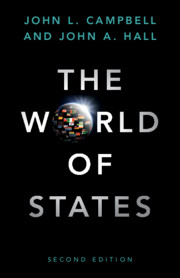Book contents
- The World of States
- The World of States
- Copyright page
- Contents
- Tables
- Preface to the First Edition
- Preface to the Revised, Second Edition
- Introduction
- 1 The Past
- 2 Conditions of Existence, Old and New
- 3 Challengers?
- 4 States of the Global South
- 5 The North
- 6 Still the Strongest Power on Earth?
- Conclusion
- References
- Index
3 - Challengers?
Published online by Cambridge University Press: 28 May 2021
- The World of States
- The World of States
- Copyright page
- Contents
- Tables
- Preface to the First Edition
- Preface to the Revised, Second Edition
- Introduction
- 1 The Past
- 2 Conditions of Existence, Old and New
- 3 Challengers?
- 4 States of the Global South
- 5 The North
- 6 Still the Strongest Power on Earth?
- Conclusion
- References
- Index
Summary
Perhaps the single most important issue in the postwar world has been that of development, of polities determined to catch up with the advanced North – an aim that became imaginable with the rise of Japan, the first Asian industrial power. This chapter pays especial attention to the BRICs (Brazil, Russia, India, and China) given the contemporary claim that they may overturn the current ordering of the world political economy. The acronym is unfortunate for several reasons. The four countries exhibit tremendous variation in the ways in which they have managed the issues of security, order, and national belonging. Furthermore, their interests do not always neatly overlap. Then some argue that the European Union (EU) is quite as much a challenger to the United States; we consider this issue in Chapter 5. Finally, if Russia is scarcely a rising power in economic terms, as we will argue, there can be no doubt about its desire to challenge the United States geopolitically. But we begin by noting the two approaches that dominated development theory until recently. Immediate characterization of these positions will allow our own approach, in this chapter and the next, to become clear.
- Type
- Chapter
- Information
- The World of States , pp. 80 - 116Publisher: Cambridge University PressPrint publication year: 2021



